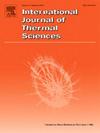基于信息熵终止准则的扩散火焰三维温度场层析重建
IF 5
2区 工程技术
Q1 ENGINEERING, MECHANICAL
International Journal of Thermal Sciences
Pub Date : 2025-09-29
DOI:10.1016/j.ijthermalsci.2025.110350
引用次数: 0
摘要
温度是燃烧系统表征的关键参数,辐射测温已成为火焰温度监测的主要非侵入式技术。在温度场重建中,反演算法固有的半收敛现象需要特别注意终止准则,因为这些参数对计算效率和重建精度都有重要影响。本研究引入了一种创新的基于信息熵的终止准则来解决这一挑战,在确保及时停止迭代的同时,能够快速识别最优的反演结果。与依赖残差或预定迭代计数的传统标准不同,基于熵的方法具有更广泛的适用性,减少了对经验参数的依赖。数值模拟初步证实了迭代重建过程中半收敛性的存在。随后对不同测量误差条件下的各种终止准则进行对比分析,揭示了信息熵法的优越性能。鲁棒性评估跨越不同的信噪比和松弛因素进一步证实了该方法的稳定性。利用多相机成像系统测量非轴对称乙烯扩散火焰的三维温度分布进行了实验验证,反演验证的相关系数为0.8925,证明了实验的有效性。数值和实验结果都证实了信息熵终止准则在测量不确定度条件下具有可靠的性能,为模拟研究和实际燃烧诊断提供了显著的优势。本文章由计算机程序翻译,如有差异,请以英文原文为准。
Three-dimensional temperature field tomographic reconstruction of diffusion flame based on information entropy termination criterion
Temperature represents a critical parameter in combustion system characterization, where radiation thermometry has become the predominant non-invasive technique for flame temperature monitoring. In the reconstruction of temperature fields, the inherent semi-convergence phenomenon of inversion algorithms requires particular attention to termination criteria, as these parameters crucially affect both computational efficiency and reconstruction accuracy. This study introduces an innovative termination criterion based on information entropy to address this challenge, enabling rapid identification of optimal inversion results while ensuring timely iteration cessation. Unlike conventional criteria relying on residual errors or predetermined iteration counts, the entropy-based approach exhibits broader applicability with reduced dependence on empirical parameters. Numerical simulations initially confirm the existence of semi-convergence during iterative reconstruction processes. Subsequent comparative analyses of various termination criteria under different measurement error conditions reveal the superior performance of the information entropy method. Robustness evaluations across varying signal-to-noise ratios and relaxation factors further substantiate the method's stability. Experimental validation was conducted using a multi-camera imaging system to measure three-dimensional temperature distributions in non-axisymmetric ethylene diffusion flames, achieving a 0.8925 correlation coefficient in back-projection verification that demonstrates practical effectiveness. Both numerical and experimental results confirm that the information entropy termination criterion provides reliable performance under measurement uncertainty conditions, offering significant advantages for simulation studies and practical combustion diagnostics.
求助全文
通过发布文献求助,成功后即可免费获取论文全文。
去求助
来源期刊

International Journal of Thermal Sciences
工程技术-工程:机械
CiteScore
8.10
自引率
11.10%
发文量
531
审稿时长
55 days
期刊介绍:
The International Journal of Thermal Sciences is a journal devoted to the publication of fundamental studies on the physics of transfer processes in general, with an emphasis on thermal aspects and also applied research on various processes, energy systems and the environment. Articles are published in English and French, and are subject to peer review.
The fundamental subjects considered within the scope of the journal are:
* Heat and relevant mass transfer at all scales (nano, micro and macro) and in all types of material (heterogeneous, composites, biological,...) and fluid flow
* Forced, natural or mixed convection in reactive or non-reactive media
* Single or multi–phase fluid flow with or without phase change
* Near–and far–field radiative heat transfer
* Combined modes of heat transfer in complex systems (for example, plasmas, biological, geological,...)
* Multiscale modelling
The applied research topics include:
* Heat exchangers, heat pipes, cooling processes
* Transport phenomena taking place in industrial processes (chemical, food and agricultural, metallurgical, space and aeronautical, automobile industries)
* Nano–and micro–technology for energy, space, biosystems and devices
* Heat transport analysis in advanced systems
* Impact of energy–related processes on environment, and emerging energy systems
The study of thermophysical properties of materials and fluids, thermal measurement techniques, inverse methods, and the developments of experimental methods are within the scope of the International Journal of Thermal Sciences which also covers the modelling, and numerical methods applied to thermal transfer.
 求助内容:
求助内容: 应助结果提醒方式:
应助结果提醒方式:


